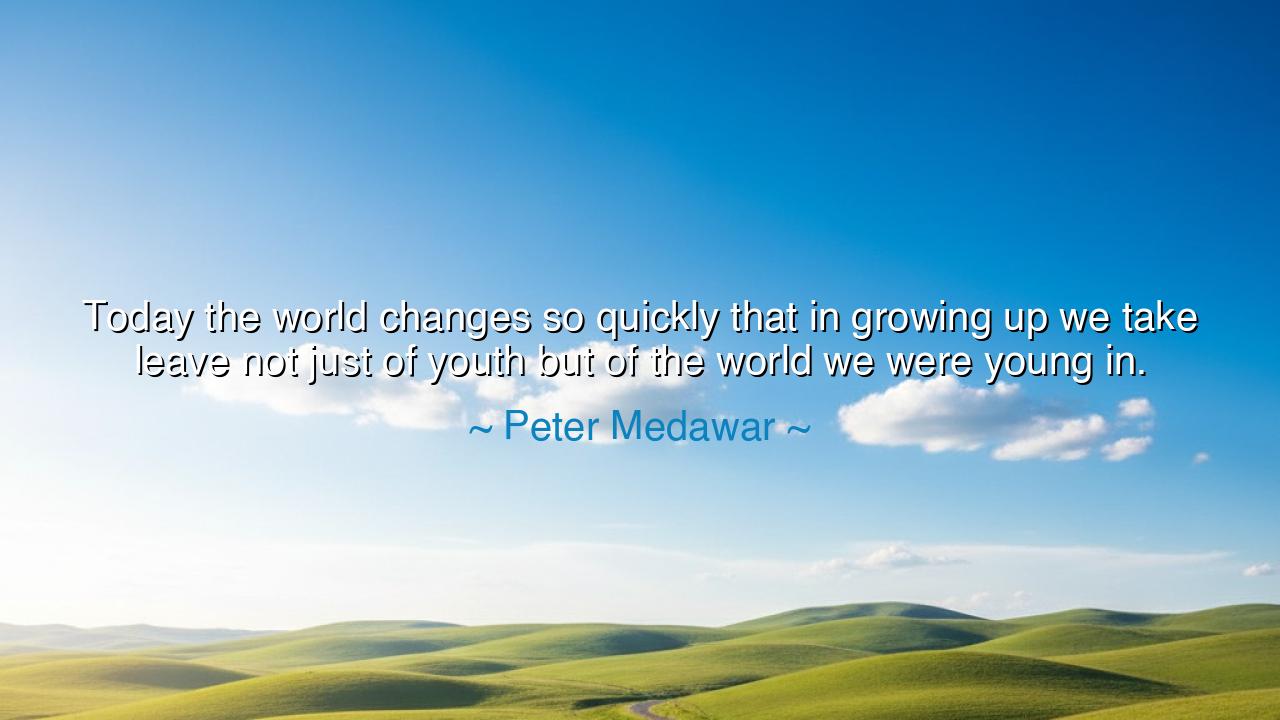
Today the world changes so quickly that in growing up we take
Today the world changes so quickly that in growing up we take leave not just of youth but of the world we were young in.






Hear, O seeker of wisdom, the voice of Peter Medawar, who gazed upon the swift currents of time and spoke thus: “Today the world changes so quickly that in growing up we take leave not just of youth but of the world we were young in.” These words strike like the toll of a bell in the night, reminding us that change is not the gentle tide of the past, but a river in flood, sweeping away not only our childhood but also the very land upon which our childhood once stood. To mature in such an age is to discover that memory holds a world no longer present, a vanished country that cannot be revisited except in thought and story.
In ancient days, the generations lived within the same soil of customs. The elders grew old, yet the songs, the tools, the ways of dwelling remained familiar to their children. But now, the wheel of progress turns with such speed that the father cannot guide his son with the tools of his youth, nor the mother teach her daughter the ways of her girlhood, for the world has already transformed. Thus, to grow up is to bid farewell twice—once to the innocence of youth, and again to the familiar world in which that innocence once blossomed.
Behold the example of those who came of age in the twentieth century. A child born in the quiet villages of Europe before the Second World War might have known candlelight, horse-drawn carts, and letters written by hand. By the time she reached old age, she witnessed men walking on the moon, machines that spoke with human voices, and messages flying faster than thought across oceans through invisible webs. She did not merely grow older; she passed from one universe into another. Her youthful world dissolved, leaving her memories like relics of a vanished civilization.
Think also of the people of Japan, who before 1945 lived under the ancient order of the Emperor, in traditions stretching back centuries. After the fires of war, their society was remade in a single generation: democratic, industrial, modern, entwined with the West. An old farmer could walk his land and scarcely recognize the city his grandson called home. Here we see Medawar’s truth embodied: in the span of a single lifetime, one must take leave not only of youth but of the very world in which that youth had meaning.
Let this be a reminder that nostalgia, though sweet, cannot bind the river of time. The wise do not cling to the vanished world but carry its lessons forward into the new. Just as the tree sheds its blossoms that fruit may grow, so must we shed the familiar world of our youth to embrace the world unfolding before us. To resist is to wither; to adapt is to live fully in each age.
What lesson then shall we hand down? It is this: cherish the memories of your youthful world, but do not be enslaved by them. Teach your children the stories of your beginnings, not to freeze them in time, but to give them roots as they move through their own transforming age. And in your own heart, hold fast to the courage of adaptability, for the world will not slow for your comfort.
Therefore, when the world shifts beneath your feet, do not despair. See instead the chance to grow anew, to be reborn not once, but many times across your years. Carry forward the essence of who you are, but let the form change with the times. In this way, though you take leave of your youth and its vanished world, you remain ever alive, ever present, ever ready to meet the dawning age with open hands.






AAdministratorAdministrator
Welcome, honored guests. Please leave a comment, we will respond soon